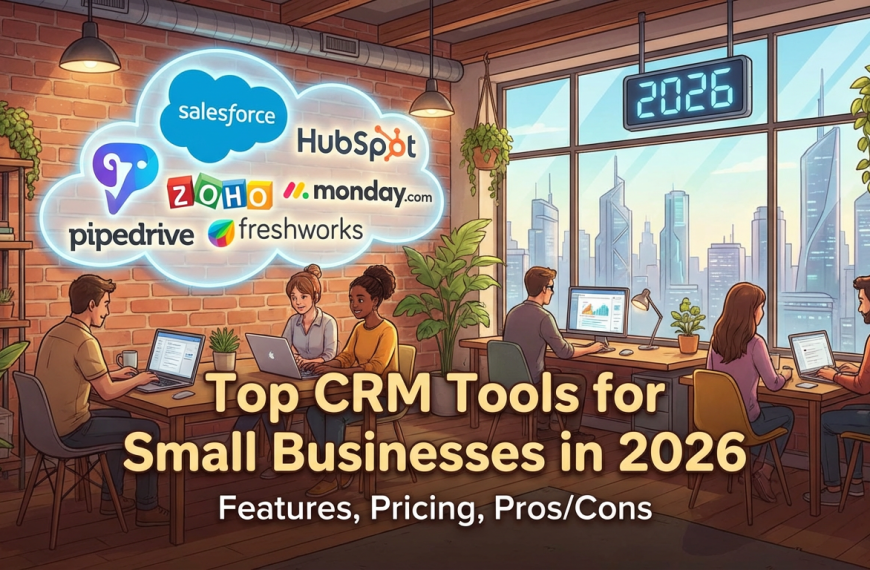How to Choose the Best CRM Platforms Without Getting Overwhelmed: A Comprehensive Guide

Introduction: Problem or Opportunity
In today’s fast-paced business environment, selecting the right Customer Relationship Management (CRM) platform can be a daunting task. With a plethora of options available, each boasting unique features and benefits, businesses often find themselves overwhelmed. Making an informed choice is crucial as the right CRM can streamline operations, enhance customer relationships, and drive growth. This guide aims to simplify the selection process by highlighting key features, comparing popular platforms, and offering practical evaluation tips.
Section 1: Key Features to Look For in a CRM Platform

When choosing a CRM platform, it’s essential to focus on features that align with your business needs. Here are some critical features to consider:
Contact Management
A robust CRM should offer comprehensive contact management capabilities, allowing you to store and organize customer information efficiently.
Interaction Tracking
Tracking customer interactions across various channels helps in understanding customer behavior and improving engagement strategies.
Automated Notifications and Reminders
Automated alerts ensure that no follow-up or task is missed, enhancing productivity and customer satisfaction.
Pipeline Monitoring
Effective pipeline monitoring provides insights into sales processes, helping to identify bottlenecks and optimize performance.
Integration Capabilities
A CRM that integrates seamlessly with other business tools can significantly enhance operational efficiency.
Section 2: Comparison of Popular CRM Platforms

Several CRM platforms stand out in the market, each offering unique features. Here’s an overview of some top contenders:
- HubSpot: Known for its user-friendly interface and robust marketing tools.
- Salesforce: Offers extensive customization and integration options.
- Zoho: Provides a cost-effective solution with a wide range of features.
- Pipedrive: Focuses on sales pipeline management with intuitive design.
| Platform | Pricing | Key Features | Target Users |
|---|---|---|---|
| HubSpot | Free/$50+ | Marketing automation, CRM | Small to large businesses |
| Salesforce | $25+ | Customization, integrations | Enterprises |
| Zoho | $12+ | Affordable, feature-rich | Small to medium businesses |
| Pipedrive | $15+ | Sales pipeline focus | Sales teams |
Section 3: Tips for Evaluating CRM Platforms Based on Business Needs

Choosing the right CRM requires a clear understanding of your business objectives and requirements. Here are some tips:
Define Clear Objectives and Requirements
Identify what you aim to achieve with a CRM and list the features that are non-negotiable for your business.
Consider User-Friendliness and Scalability
A user-friendly CRM ensures higher adoption rates, while scalability ensures the platform grows with your business.
Evaluate Customer Support and Training Resources
Reliable customer support and comprehensive training resources are vital for smooth implementation and ongoing use.
Section 4: Common Mistakes to Avoid When Choosing a CRM

Avoid these common pitfalls to ensure a successful CRM implementation:
Poor Objectives and Strategy
Without clear objectives, it’s challenging to measure the success of a CRM.
Ignoring User Adoption and Change Management
Ensure that your team is on board and adequately trained to use the new system.
Underestimating the Importance of Data Quality and Integration
High-quality data and seamless integration with existing systems are crucial for maximizing CRM benefits.
Section 5: Latest Trends in CRM Technology

The CRM landscape is continually evolving. Here are some trends to watch:
AI and Automation in CRM
AI-driven insights and automation are enhancing CRM capabilities, making processes more efficient.
Integration with Other Business Tools
CRMs are increasingly integrating with other tools, providing a unified platform for business operations.
Focus on Customer Experience and Personalization
Modern CRMs emphasize personalized customer experiences, driving engagement and loyalty.
Conclusion + CTA
Choosing the right CRM platform is a critical decision that can significantly impact your business’s success. By understanding your needs, evaluating options carefully, and staying informed about the latest trends, you can make a choice that supports your business goals. Start by assessing your CRM needs today and explore the platforms that align with your objectives.


 By
By










